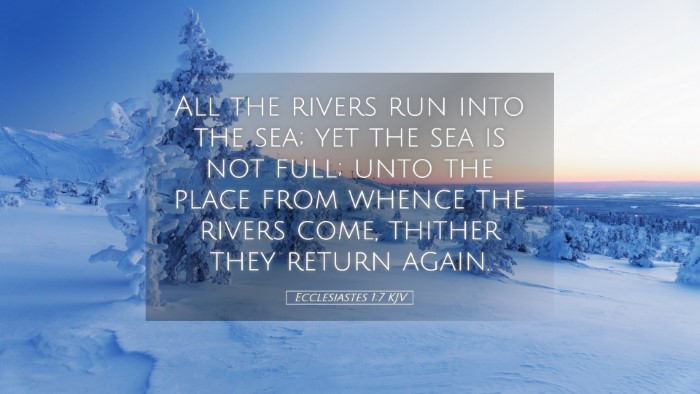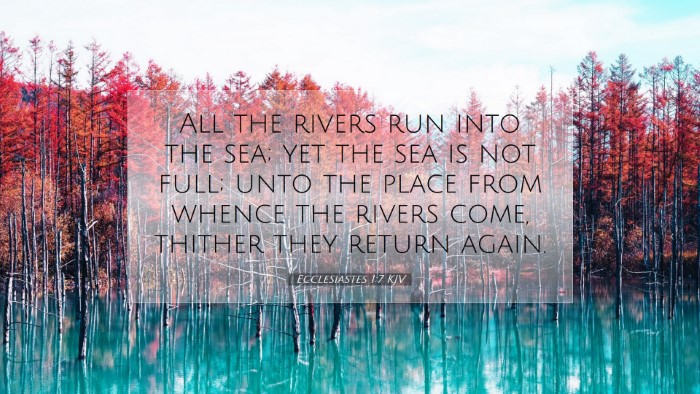Commentary on Ecclesiastes 1:7
Ecclesiastes 1:7 states, "All the rivers run into the sea; yet the sea is not full; unto the place from whence the rivers come, thither they return again." This verse captures the cyclical nature of life and the futility of human endeavor in a world governed by endless repetition. This commentary seeks to combine insights drawn from various public domain sources to offer a comprehensive examination of this profound truth.
Contextual Background
The Book of Ecclesiastes is attributed to Solomon, commonly known as the "Preacher." He explores various avenues of wisdom and human experience to depict the ultimate meaninglessness of worldly pursuits when disconnected from a relationship with God. Chapter 1 begins with observations about the mundane and cyclical patterns in nature, where Solomon contemplates the pursuit of wisdom and worldly gain.
Breaking Down Ecclesiastes 1:7
In this verse, Solomon uses the metaphor of rivers flowing into the sea to illustrate his observations about the world. Let us delve into key insights provided by the aforementioned commentators:
1. The Rivers and The Sea: A Symbolic Representation
Matthew Henry notes that the rivers symbolize the endeavors and efforts of humanity, which constantly strive for fulfillment, while the sea represents the vast and insatiable nature of desire and ambition. The rivers may flow endlessly, yet the sea does not fill up; this points to the idea that material pursuits can never truly satiate the human spirit.
2. The Futility of Cyclical Patterns
Albert Barnes emphasizes that the imagery of rivers returning to their source is indicative of the repetitive patterns in life. Just as the rivers continuously cycle back, our lives often follow predictable patterns that lead to exhaustion without ultimate satisfaction. This cyclical nature serves as a reminder that true fulfillment lies not in endless pursuit but in understanding life's limitations.
3. Reflection on Human Endeavors
Adam Clarke argues that this verse provides a commentary on the labor of man. No matter how much effort one exerts, akin to the rivers pouring into the sea, it ultimately leads to the same results — the sea remains unfilled, representing the void of worldly achievement. The relentless pursuit, therefore, highlights human futility.
Theological Implications
The theological weight of Ecclesiastes 1:7 provides rich insights for scholars and theologians alike:
- Creation's Groaning: Romans 8:22 speaks of creation groaning under the weight of futility, aligning with Solomon's observations. The endless cycle of nature reflects a world marred by sin and longing for redemption.
- Inherent Dissatisfaction: Ecclesiastes challenges the belief that fulfillment can be achieved through earthly means. The sea's inability to be filled calls attention to the transient nature of material satisfaction.
- Divine Providence: The return of rivers to their source suggests God’s sovereignty over creation; it mirrors humanity's need to return to God for ultimate satisfaction and purpose.
Practical Applications
Given the profound insights of Ecclesiastes 1:7, pastors and leaders can draw practical applications for their congregations:
- Encourage Spiritual Reflection: Teach congregants to reflect on their pursuits. Are their goals leading to true fulfillment, or are they caught in a cycle of repetition?
- Promote Contentment in God: Reinforce that true contentment comes through a relationship with God, urging followers to seek Him above temporal pursuits.
- Recognize the Limits of Human Effort: Help congregants understand the futility of striving for worldly gain without acknowledging the sovereignty of God over their lives and endeavors.
Conclusion
Ecclesiastes 1:7 serves as a powerful reminder of life's cyclical nature and the futility of human attempts to find lasting fulfillment apart from God. By examining the combined insights of Matthew Henry, Albert Barnes, and Adam Clarke, we grasp the depth of Solomon's message that challenges us to rise above the mundane and seek true meaning in our Creator.


